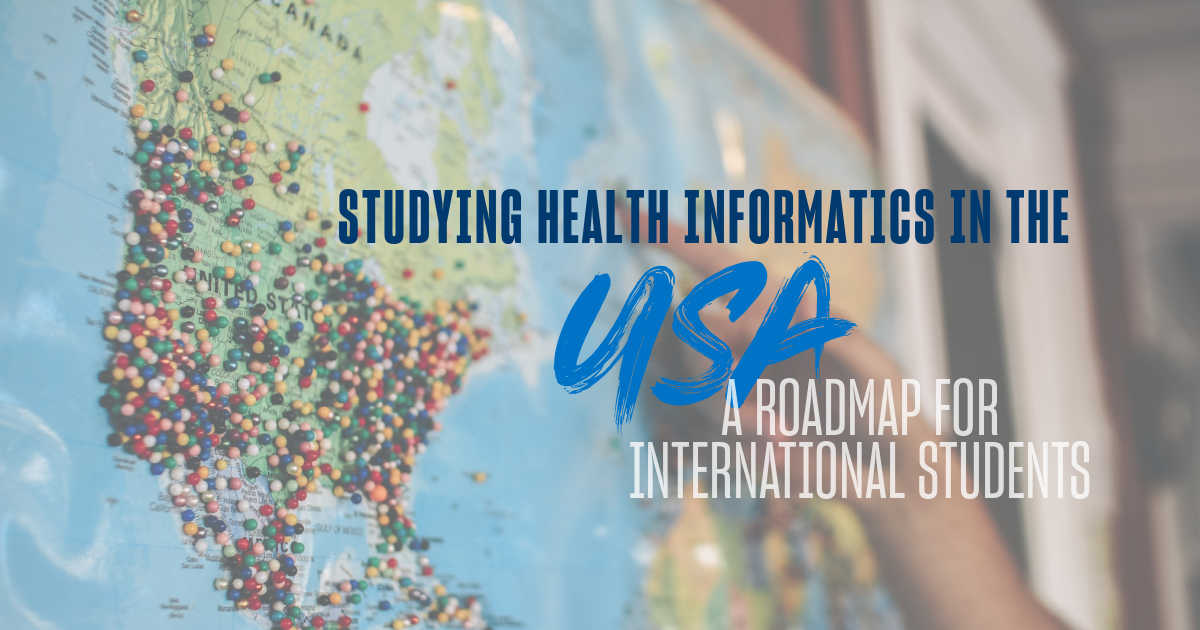Studying Health Informatics in the USA: A Roadmap for International Students
The health informatics field is booming around the world. That means the demand for highly skilled and well-trained health informatics professionals is at an all-time high, creating new opportunities for international students who have earned their master’s degree in health informatics.
If you’ve been thinking about seeking your master’s degree, there are many reasons to consider studying health informatics with a university that is located in the United States. The first and most obvious reason is that the universities and colleges in your home country might not have a health informatics MSc program, or if they do offer such a degree the faculty who teach it might not have professional experience working in the field. Also, a well-established American-based health informatics master’s degree program will prepare you for professional certification exams you will need to take, most notably from the leading global health informatics thought leader, HIMSS, the Healthcare Information and Management Systems Society.
Researching and selecting a master’s program is always a big task, and can feel even more overwhelming when you are evaluating universities outside of your home country. But the effort will be worth it. Here are just some of the reasons to obtain your health informatics master’s degree from an American university, as well as a few tips to help you get started.
Why International Students Should Get a Master’s Degree in Health Informatics in the USA
1. Top American Universities
The U.S. is home to some of the top universities in the world and is a leader in health informatics and health care delivery in general, making it a great place to learn health informatics. Earning an MSc in Health Informatics from an American university will not only prepare you for a promising career, but will also help you be more competitive when applying for jobs after graduation.
2. High Global Demand for Health Informatics Professionals
The rapid advancement of medical technologies and electronic medical records has produced immense amounts of data and information that require educated and technically savvy health informatics professionals around the world. And since the demand has expanded so quickly, there is a global shortage of health informaticists.
“There are not enough informatics professionals available with advanced training in analytics and evaluation. This is a necessary building block for countries to have sustainable and successful informatics systems and health outcomes,” said Dr. Charles Safran and Yuri Quintana, authors of the textbook, Global Health Informatics: How Information Technology Can Change our Lives in a Globalized World. This need is creating a robust employment landscape for aspiring health informaticists.
Many early- and mid-career professionals who are looking for new job opportunities have taken note of the rising employment prospects for trained health informaticists, leading to an increase in foreign student enrollments in MSc in Health Informatics programs at American universities. For those with a master’s degree, there are job opportunities across many settings, industries and sectors, such as hospitals, medical centers, pharma/biotech, public health, insurance, government and technology.
3. Promising Future Job Growth
A 2020 report estimated that the global health informatics market will grow at a compounded annual growth rate of 14.2%. This forecasted boost in the market means jobs will be plentiful for health informatics professionals, and those who hold a master’s degree in the field will be especially well suited to fill them.
The global health informatics job market is growing for a few reasons. First, in an increasingly globalized world, there is a need for an integrated universal system to diagnose, interpret, analyze and record data. Such a system would allow continuity of care on a more international scale, with health informaticists supporting such a database.
Additionally, as the world’s population continues to age, there will be more demand for health care professionals across many medical specialities. And as people access care, they will create more and more health care data to be processed, secured and analyzed. According to U.N. data, the number of persons aged 80 years or over is projected to triple, from 143 million in 2019 to 426 million in 2050. These people will require higher levels of care and collaboration amongst health care providers, a process made easier and more effective through the exchange of health information. This work is done by health informaticists.
[RELATED] Health Informatics Jobs & Salaries In the U.S.A >>
Skills Needed to Work in Health Informatics
A career in health informatics requires a number of technical, analytical, administrative, and interpersonal skills to be successful. While you may have had some exposure to these skills during undergraduate study and your professional experience, a health informatics master’s program will help you further refine and develop your expertise across the following areas:
- Programming knowledge: Computer programming is not necessarily a requirement for every health informaticist, but familiarity with languages such as Java, C, Python and SQL will provide a competitive edge.
- Knowledge of health data systems: Health informaticists will work closely with the health data systems used in the workplace and should be prepared to learn new systems as technology continues to evolve. They will also be tasked with building and managing robust databases that house health data, and ensuring data security and hygiene protocols are in place and effective.
- EHR expertise: Proficiency in the protocols, regulatory requirements and emerging trends around the management of electronic health records is also important. Keeping all medical documentation in EHRs is a required practice in the United States, but this practice has not yet been adopted internationally. Learning how to implement and optimize an EHR could make you a very valuable employee to a health system that is just beginning to move to electronic medical records.
- Data analytics: Familiarity with how the vast volumes of electronic data now available from a multitude of sources can be analyzed to develop strategies that impact the quality, efficiency and cost of care. Health informaticists must then apply their knowledge of information systems, databases and information technology to help design effective technology systems that gather, store, interpret and manage this data to improve care and patient outcomes.
- Health care industry knowledge: Thorough understanding of the operations and workflows of clinical care provider organizations, including health systems leadership, delivery of care, outcomes, billing/coding practices, information governance, data privacy concerns and more.
- Interpersonal skills: Including teamwork and team building, empathy and conflict resolution.
- Problem-solving skills: For example, challenges around sharing of data or improving clinical documentation workflows, and extracting meaning from vast and diverse data sets.
- Communication skills: In addition to basic communication skills, health informatics roles often require the ability to communicate complex information clearly and accurately. Strong listening skills are as essential as the ability to tell a story with data.
How to Begin Your Search for a Health Informatics Master’s Program with an American University
To be eligible for graduate study with an American college or university, you should have completed the equivalent of a regionally accredited bachelor’s degree. Assuming your undergraduate work was completed outside the United States, you will need to have your college coursework evaluated by a foreign credit evaluation service such as World Education Services. This credit validation process “translates” your foreign university transcript into a report that can be understood by U.S.-based universities, and often takes weeks or even months to complete. It’s a good idea to get this process started as early as possible, because your undergraduate university may take a long time to send the required official transcripts to the credit validation company.
Along with your degree evaluation, you will also typically need to provide:
- One or more letters of recommendation
- A graduate admissions test result (e.g. GRE or GMAT – varies by university)
- Proof of proficiency in English (e.g. TOEFL/IELTS) if English is not the primary language spoken in your country of origin. This is often waived if you earned your bachelor’s degree in the United States, or if English was the language in which your undergraduate program was taught.
- A statement of purpose, outlining your aspirations and demonstrating your English proficiency as well as academic preparation for graduate-level study with an American university
Once you have your required documents in order, there are four steps you should take to start the process of earning your MSc in Health Informatics. According to the U.S. government, you should:
- Research Your Options. There are thousands of colleges and universities in the U.S.A., but you need to make sure the schools you apply to offer an MSc in Health Informatics and have earned “regional accreditation”. In the United States, regional accreditation is the highest standard for a university to meet. Beyond that, you can use many online resources to research schools and find the best health informatics degree program.
- Evaluate Online vs. In-Person Options. The college or university you choose to apply to may offer their program on-campus, online or both. As an international student, you may find that an online health informatics program could be the ideal option. It provides the flexibility you need to study and work your own hours, doesn’t require travelling far from home and obtaining a visa, and is typically much more affordable. It’s also important to note that you will still receive the same high-quality education in an online health informatics degree program as you would in an on-campus one. The cost savings of choosing an online option can be significant.
- Select your University. When you are ready to make your decision, there are a few markers of an excellent health informatics master’s degree program to use as a guide. First, make sure you select a college or university that offers a curriculum that will help you develop the skills you’ll need to launch or advance your career while also preparing you to succeed as the field evolves. Second, decide what specialization within the health informatics field, such as data analytics or leadership, you would like to study. With these parameters as a guide, you can trust that the health care informatics master’s degree program you choose will be a wise investment in your future.
- Secure Funding. The U.S. government does not provide federal loans, grants or scholarships for international students. As an international student, you will have to find alternative sources of funding, such as study-abroad scholarships through your home country’s government or private sector organizations.
- Apply for a Visa. This is only necessary if you are planning to travel to the United States to study. If you enroll in an online program, disregard this step.
You can only apply for a student visa AFTER you have been accepted by a certified college or university and receive Form I-20. To learn more, the U.S. State Department has a useful student visa application guide to walk you through the process.


